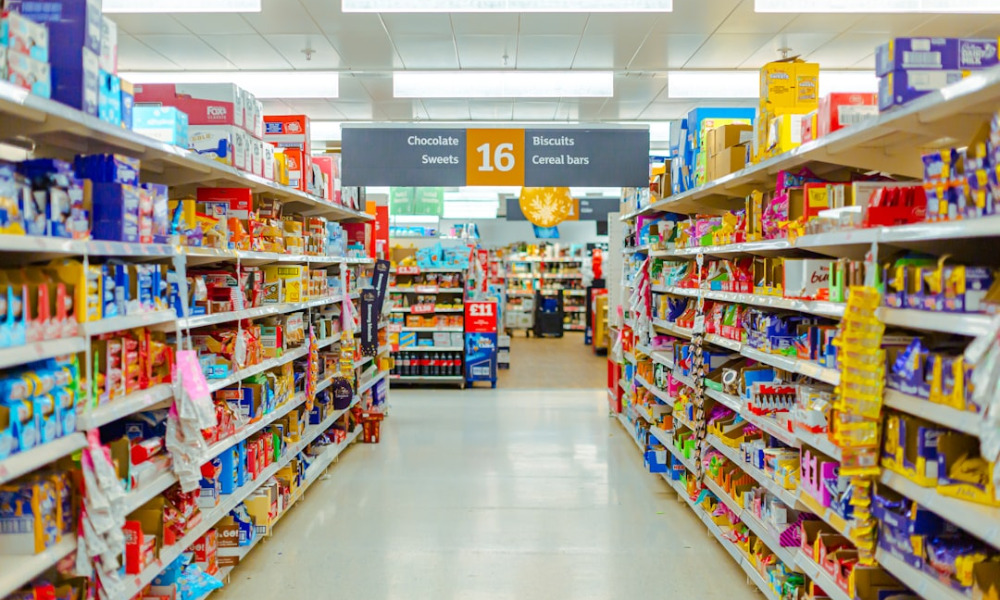
How UK Supermarkets are Leveraging Local Influencers to Dominate Christmas Campaigns
Christmas is the most wonderful—and competitive—time of year for UK supermarkets. As the holiday season approaches, brands battle to stand out in the bustling festive market. This year, many supermarkets have turned to an increasingly popular strategy: influencer marketing. But instead of relying on global celebrities, they are tapping into the power of local and micro-influencers to create authentic connections with their audiences.
This shift towards relatable, community-focused campaigns is reshaping how brands engage with consumers, building loyalty and boosting sales during the busiest shopping period of the year. Here’s how UK supermarkets are harnessing the festive power of influencers to win hearts and wallets this Christmas.
The Rise of Local and Micro-Influencers in Retail Marketing
The influencer marketing industry has evolved rapidly, with brands moving away from big-name celebrities in favour of smaller, more targeted campaigns. According to the Kolsquare State of Influencer Marketing Report, 47% of UK brands now work with nano-influencers (creators with fewer than 10,000 followers), compared to just 29% partnering with celebrity influencers.
Why this shift? Nano- and micro-influencers boast higher engagement rates, authenticity, and the ability to target specific communities. They create content that feels more personal and relatable, often spotlighting local experiences or everyday moments, which resonates deeply with their audiences.
For supermarkets, this presents an invaluable opportunity. By partnering with influencers rooted in specific regions, brands can create hyper-local campaigns that highlight brick-and-mortar stores, promote user-generated content (UGC), and foster a sense of community—all while showcasing their festive offerings in an authentic, accessible way.
Family Influencers: Connecting with Festive Shoppers
Christmas is synonymous with family, and supermarkets are increasingly collaborating with mum-and-dad influencers to target the UK’s 19.4 million families. These creators are masters of storytelling, sharing relatable parenting moments, meal prep ideas, and family-friendly activities that tie seamlessly into festive campaigns.
For example, mum-of-four Nadia Thorburn, known for her candid Instagram content, exemplifies the power of family influencers. Her honest posts, like reflecting on the challenges of family life during the holidays, consistently garner high engagement, with some posts receiving thousands of likes.
When done correctly, these partnerships can drive significant results. However, brands must navigate these collaborations carefully, ensuring they comply with advertising regulations—particularly when children are featured in campaigns. By partnering with family influencers who prioritise authenticity and adhere to guidelines, supermarkets can effectively connect with parents looking for quality, budget-friendly Christmas products.
Supermarket Campaign Success Stories: 2024 Highlights
Supermarkets across the UK have demonstrated just how impactful influencer marketing can be during the festive season. Here are five standout campaigns from 2024 that showcase different approaches to leveraging influencer power:
1. Waitrose: Classy Content and Creative Campaigns
Waitrose has gone all-in on influencer marketing this year, combining a luxurious influencer event with creative social media content.
- Christmas Influencer Event: In November, Waitrose hosted a high-end Christmas dinner at Brownsea Island Castle, inviting micro-influencers to share festive food content. Creators like Katie Pix, known for her approachable cooking style, tagged Waitrose in over 10 posts, creating around £10,000 in Earned Media Value (EMV).
- “Whodunnit” Ad Campaign: Waitrose also launched a playful Christmas ad involving a stolen pudding, supported by influencer-generated content. Creators like Mollie Pearce kept audiences engaged with light-hearted posts, building anticipation for the ad’s sequel.
This dual strategy combined authenticity and luxury, creating a buzz around the Waitrose Christmas range.
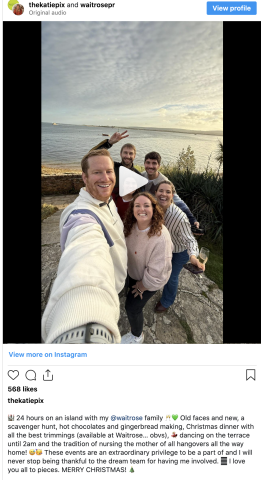
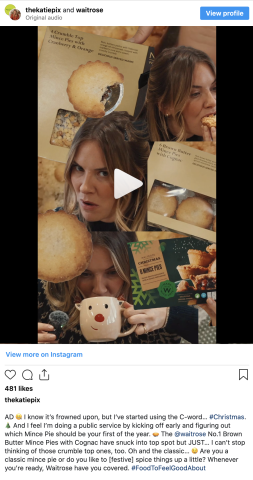
2. Marks & Spencer: Long-Term Partnerships Pay Off
Marks & Spencer (M&S) focused on deep, ongoing collaborations with trusted influencers like Zoe Sugg.
- Influencer Profile: Sugg, a veteran influencer with 9 million Instagram followers, has worked with M&S for several years. Her November 2024 posts showcasing M&S Christmas products—styled in her signature relatable yet aspirational way—garnered over 82,000 likes and 2 million video plays.
- Campaign Highlights: Sugg’s approachable content highlighted festive deals and quality food items, generating over £400,000 in EMV across four posts. M&S’s emphasis on authenticity, coupled with Sugg’s ability to connect with her audience, proved a winning formula.
3. Lidl: The Festive Freeway Truck Tour
Lidl delivered festive cheer with its Freeway Truck, a nod to Coca-Cola’s iconic holiday campaign.
- Local Focus: The truck visited nine locations across the UK, from Dundee to Southampton, distributing free Middle of Lidl items and golden tickets worth £100 in festive food.
- Influencer Impact: Family influencers like Jen (@jen_and_her_tribe_of_7) shared their experiences shopping at Lidl and visiting the truck. Jen’s content, featuring her family exploring the event, resonated with her audience and achieved a staggering 136% engagement rate.
Lidl’s campaign showed how combining local events with relatable influencers can create memorable, buzz-worthy experiences.
4. Sainsbury’s: Collaborating with Food Experts
Sainsbury’s worked with niche food influencers to highlight its premium festive offerings.
- Influencer Profile: Creators like Zena Kamgaing (@zenaskitchen) shared innovative recipes using Sainsbury’s products, such as a tiramisu featuring their panettone. Her content achieved an engagement rate of 2.71%, generating around £15,000 in EMV.
- Authenticity First: Influencers were encouraged to create honest, unscripted reviews, with food reviewer @beccaeatseverything spotlighting her top five picks from Sainsbury’s Christmas range. Her genuine approach received praise from followers, reinforcing trust in the brand.
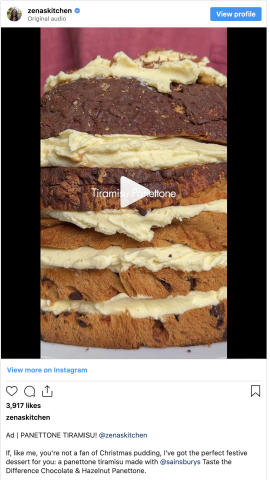
5. ASDA: The Gnome Market
ASDA’s Gnome of Christmas campaign combined a whimsical TV ad with a festive market experience.
- Local Activations: ASDA’s Gnome Market featured family-friendly activities inspired by their Christmas ad. Influencers like Yemi Fajembola (@yemithompson_), who shares family content, posted about their visits, achieving a 3.67% engagement rate.
This campaign seamlessly blended online and offline engagement, driving excitement around ASDA’s festive range.
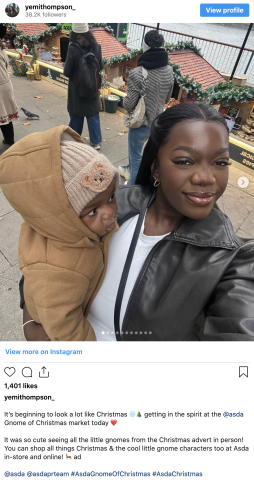
Why These Campaigns Work
Each of these campaigns highlights key strategies that make influencer marketing so effective during the holiday season:
- Authenticity: Collaborating with relatable influencers ensures content feels genuine and trustworthy.
- Community Engagement: Local influencers help supermarkets connect with specific communities, amplifying their impact.
- Cross-Channel Promotion: Combining influencer content with traditional advertising increases reach and resonance.
- Focus on Value: Showcasing deals, quality, and convenience appeals to budget-conscious shoppers during the cost-of-living crisis.
- Creativity: Memorable campaigns like Lidl’s Freeway Truck or Waitrose’s “Whodunnit” ad stand out in a crowded market.
What Supermarkets Can Learn for Future Campaigns
As influencer marketing continues to evolve, supermarkets must stay ahead of the curve. Key takeaways include:
- Invest in Micro-Influencers: Smaller creators offer higher engagement rates and more targeted reach, making them ideal for localised campaigns.
- Prioritise Authenticity: Consumers value real, relatable content over polished, high-production ads.
- Leverage Family Influencers: Parents trust recommendations from relatable creators, particularly during the festive period.
- Embrace Hybrid Strategies: Combining in-person events with online promotion can amplify a campaign’s success.
- Stay Compliant: Ensuring adherence to advertising regulations is essential, especially when working with family or local influencers.
The Future of Festive Marketing
Influencer marketing has transformed how UK supermarkets approach their Christmas campaigns. By tapping into local communities and prioritising authenticity, brands can build deeper connections with their audiences while showcasing their festive offerings.
The success of campaigns like Lidl’s Freeway Truck and Waitrose’s influencer dinners demonstrates the power of creative, community-focused strategies. As supermarkets continue to innovate, one thing is clear: the future of festive marketing lies in authenticity, relatability, and genuine engagement.
For shoppers, it means a more personal, meaningful connection to the brands they trust—and a little extra magic in the holiday season.

